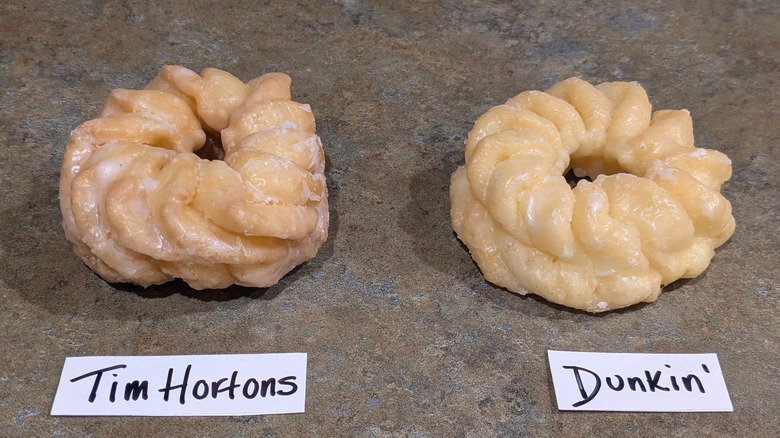Dunkin' Vs. Tim Hortons: Which Has The Best Donuts?
Canadians and Americans share a lot of similarities, one being our mutual love of the classic coffee and donut pairing. This passion is embodied in the form of coffee and donut chains all across both nations, with the most prominent being Dunkin' and Tim Hortons. Dunkin' — one of America's most esteemed national donut chains — started its journey in 1948, when its first location — then called Open Kettle — opened in Massachusetts. Later, the restaurant's name was changed to Dunkin' Donuts to celebrate the preferred method of savoring a donut and cup of coffee. In 2019, however, the "Donuts" was dropped to establish a coffee-forward brand identity. Although Dunkin' doesn't take pride in its donuts the way it once did, its customers still relish the universally loved, dessert-for-breakfast pastry for which, despite its best efforts, the brand continues to be known.
Tim Hortons, the ubiquitous Canadian coffee-and-donuts chain with some locations scattered around the U.S., has similarly humble roots. Its story began when a Toronto Maple Leafs defenseman opened his first eponymous restaurant in Hamilton, Ontario in the '60s. Today, Tim Hortons is the country's largest restaurant chain, and it's as integral to Canada's national identity as maple syrup and rugged, snow-capped mountains.
With both locations cranking out famous donuts, I decided to pit them against one another (in no particular order) for an epic, sugary showdown. I paired up popular donuts by variety from both chains and compared each based on flavor, texture, appearance, and quality to finally determine which chain reigns supreme as the pinnacle of pastry perfection.
Plain glazed
This might be blasphemous, but I think my favorite donut of all time is a nice and simple plain glazed. So, naturally, I was excited to see how Dunkin' and Tim Hortons fared against one another in this epitome-of-donuts battle. I started with Dunkin's, which was overall unremarkable. This donut's most noteworthy feature was an eggy dough that offered a slight chewiness. This dough could have benefited from a bit more sugar, especially since the glaze was minimal and provided very little added sweetness. There were very few air pockets in the dough, making it drier, denser, and more cake-like than a yeast donut should be.
Tim Hortons' plain glazed donut swooped in to up the sweet factor and create a much more iconic treat. Glaze is abundant on this donut, making it more sugary-sweet (the way a donut ought to be) than Dunkin's. It was slightly airy and less dense than its Dunkin' counterpart, and it had no egginess. That said, it wasn't as moist as I hoped it would be. Its outside layer provided most of the moisture to elevate the slightly dry center of the dough. This dough, in fact, was somewhat bland, with most of the donut's flavor provided by its plentiful glaze.
Frosted
While these two donuts differ in flavor, they're similar enough in style that I thought it fair to pit them against one another. I was looking forward to Dunkin's classic frosted option the most, as the drizzle of chocolate on the vanilla frosting created a unique (and tempting) marbled effect. The dough was softer than the other Dunkin' donuts I previously tried, indicating that this donut may have been a bit fresher than the others. It was sufficiently frosted, but only thanks to the chocolate drizzle. The chocolate overpowered the vanilla in most bites, but that was fine by me. The texture and flavor of the drizzle was much better than the bland vanilla frosting, and I found myself wishing there was more of it.
Tim Hortons' chocolate-frosted donut surprised me more than any other donut on this list. I expected a generic chocolate frosting, but when I bit into the donut, a symphony of flavors was unleashed. The frosting had rich, smokey notes and a hint of saltiness reminiscent of fine, artisanal chocolate. I also detected a hint of warming cinnamon and spicy cayenne. I was shocked by the complexity of this humble donut, to say the least. The dough was slightly dry, but I was so impressed with the frosting that I was able to overlook this shortcoming.
French cruller
There's nothing like biting into an unassuming French cruller and being blown away by its delicate fluffiness. There's no substitute for handmade French crullers from an esteemed local bakery, but I was still curious to see how Dunkin's and Tim Hortons' would compare to one another. To save time, Dunkin's French crullers are not made by hand as they once were. Despite this shortcoming, I was overall pretty impressed with its machine-produced cruller. The outside of the donut was slightly crispy, and this crispy exterior gave way to an airy, moist middle. The eggy dough did, however, have a corn-like aftertaste that distracted slightly from the cruller's famous texture. This donut would have benefited from an additional flavor, like cinnamon or a chocolate glaze.
The French cruller from Tim Hortons was almost identical to Dunkin's when it came to flavor, differing mostly in the texture and consistency departments. This cruller was exceptionally moist, almost to the point that it tasted wet. I know what you're thinking — the words "wet" and "donut" never belong together. However, its moist, spongy mouthfeel — likely due to its heavy glaze — created a melt-in-your-mouth sensation that was actually pretty appealing. Despite this donut's excessive moisture, it still retained the slightly crispy exterior indicative of a quality French cruller.
Chocolate glazed
I've since expanded my donut horizons, but there was a time when the chocolate-glazed donut was my favorite, making this a nostalgic treat for me. This is the type of donut you choose when you need a couple dozen for a party because you know everyone's going to love them, so I was surprised when I couldn't find one from Dunkin'. But while I wasn't able to track down a whole, intact chocolate glazed donut there, I was able to snag a few of Dunkin's renowned munchkins — the chain's adorably named version of donut holes — for this comparison. The little chocolate donut holes were surprisingly not very sweet, but they were still loaded with chocolate flavor. I'd call these more of a dark chocolate than a creamy, sweet milk chocolate. They had a hint of salt and a soft, melty texture that made them devilishly poppable.
The whole (and particularly large) chocolate glazed donut from Tim Hortons was loaded with glaze, something that seems to be a bit of a hallmark for the brand. Its chocolate taste was more mellow than Dunkin's, but it was enhanced by more sugar from the glaze. Despite its chocolate taste being less bold and in-your-face than Dunkin's, it was definitely more complex, much like the brand's chocolate-frosted donut. I detected smoky and spiced notes among the sweet cocoa that would make this donut an excellent coffee companion.
Boston cream
Boston cream is one of those donuts that can be the best you've ever had if it's crafted with care by a talented donutsmith. But a Boston cream can also be absolutely horrendous if it's made with low-quality ingredients by a soulless machine. Unfortunately, I found that both of these donuts fit the latter bill, with one coming out on top only by a small margin.
I expected better from Dunkin', considering its Massachusetts roots, but its Boston cream donut laughs in the face of a city that has done nothing but show it love for decades. This donut was dry and tough, and it wasn't sufficiently iced. The cream — the cardinal feature of this legendary donut style — was minimal and lackluster at best. It tasted reminiscent of custard, but I would describe it as flavorless, slimy goop.
I hoped for something better from Tim Hortons but was mostly disappointed by its take on the classic Boston cream. While it was a slight step above Dunkin's, it mostly had the same shortcomings. The dough was dry and bland, and the cream filling failed to add any much-needed flavor. The filling was on par with Dunkin's, but perhaps a little more vanilla custard-like. The only saving grace was the sufficient amount of tasty chocolate frosting on top of this dismal, disappointing donut.
Frosted with sprinkles
Perhaps the most iconic donut of them all (or at least the most fun-looking) is the frosted donut with sprinkles. This treat is adored for its crunchy texture, aesthetic appeal, and classic taste. I acquired a chocolate-frosted donut with sprinkles from Dunkin' and a vanilla-frosted donut with sprinkles from Tim Hortons to see how they stacked up. Although their frosting flavors are different, I ignored this to focus primarily on their sprinkles and dough texture.
Dunkin's frosted donut with sprinkles certainly didn't aim to make the sprinkles a main feature. Maybe I was just unlucky, but my donut had most of its sprinkles on only one side — a product of lazy donut crafting, if you ask me. The sprinkles were softer than expected, adding minimal crunch. The pastry aspect of the donut was slightly dense and less fluffy than I hoped it would be. On the other hand, my Tim Hortons' donut was absolutely teeming with sprinkles, adding a thick, slightly crunchy layer to the top of the donut and a hint of fruitiness to add complexity to the plain icing and pastry. Like the Dunkin' donut, this yeasted dough was slightly dense and chewy and less fluffy — more like a cake donut than a raised donut.
Coffee roll
Coffee rolls are a quintessential, donut-like treat offered by both Dunkin' and Tim Hortons. It's unclear whether or not this pastry actually contains coffee or if it's really just an un-iced cinnamon roll (with its name referring to the fact that it's delicious with a hot cup of joe). Nevertheless, these cinnamon-y delights from both chains were each middle-of-the-road in terms of taste and quality.
Dunkin's coffee roll was bursting with cinnamon flavor. The roll's dough was a bit dry, but I could easily chalk this up to Dunkin's donuts not being very fresh, so I tried not to judge it too harshly for this. It had more glaze than Dunkin's classic raised donuts, which, for the most part, all needed an added boost to distract from their lackluster dough.
The coffee roll from Tim Hortons had a milder flavor compared to Dunkin's, but its cinnamon taste was accompanied by other noticeable ingredients, like vanilla and a touch of citrus. Like the other Tim Hortons donuts on this list, it was adequately glazed and much more moist than its Dunkin' counterpart. The dough was also softer, airier, and more delicate than Dunkin's.
The verdict
Both Dunkin's and Tim Hortons' donuts shared a number of similarities, but the winner was obvious: Tim Hortons takes the cake (although I didn't get to try a cake donut from either location). This verdict comes mostly from the fact that Tim Hortons donuts are much more complex in flavor than Dunkin's. Outside of the chocolate-flavored treats and coffee roll, Dunkin's donuts are mostly plain-tasting, while Tim Hortons' pastries are clearly developed with multiple ingredients to add layers of nuanced flavors, which is absolutely necessary for a good donut. These complex flavors are accentuated by dough that's slightly fresher than Dunkin's, but overall it could still be a little softer and chewier.
While both chains mass-produce their donuts, I find it easier to believe that a donut from Tim Hortons could have been made by an artisanal donut craftsman. Dunkin's donuts are easy to identify as machine-made, and they're very clearly constructed with very little care and effort. Tim Hortons donuts are much more balanced, with their sweetness accompanied by spicy, fruity, or creamy flavors so that each treat offers a bit more than just sugary dough. They're also significantly more aesthetically appealing than Dunkin's, which plays a small role in why I'm choosing Tim Hortons as the chain-donut champion.
Methodology
To choose the victor in this chain-donut showdown, I set aside any personal taste preferences to evaluate each donut pairing based on the donuts' respective quality. I focused on key factors like flavors, dough texture, and appearance. I also looked for things that are trademarks of a delicious donut, primarily an even balance of sweetness, bold flavors, a melty mouthfeel, and a pleasing ratio of airiness to cakiness.
I didn't compare either brand's offerings to gourmet pastries that are far outside of their respective wheelhouses. Instead, I compared the donuts solely to one another. Freshness played a smaller role in my assessment since this aspect could come down to the time of day they were purchased and not reflect the overall quality of each brand's offerings.









